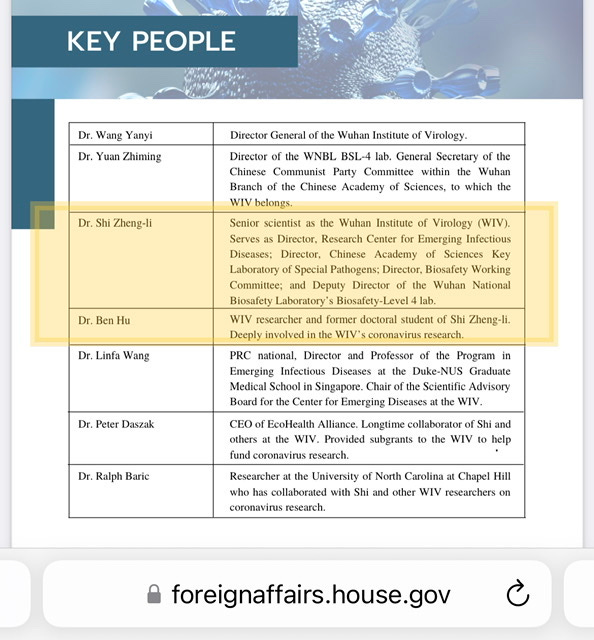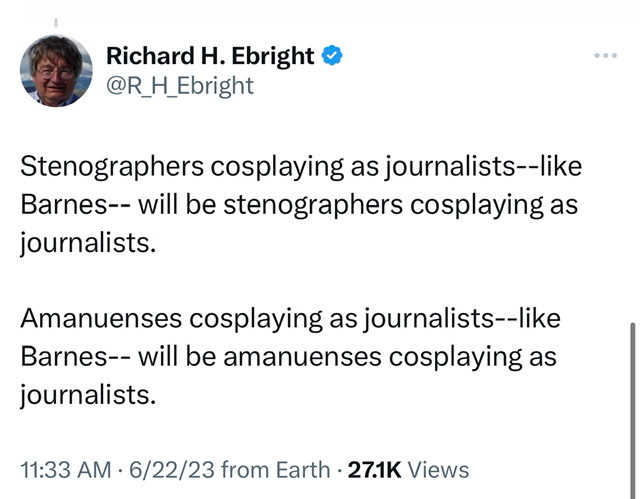The New York Times spits the bit on the lab-leak theory. Yes, again.
Guest Post by Alex Berenson
The Times’s intelligence community reporter, Julian Barnes, seems to have forgotten that his job is to COVER agencies, not vomit up the pablum they feed him at readers
The New York Times embarrassed itself mightily on Covid yesterday.
I know, day that ends in a Y.
But this time was even worse than usual – and for worse than the usual reasons.
Julian Barnes, who covers the intelligence community for the Times, failed to report actual news about the likelihood the coronavirus escaped from a Chinese lab and the White House’s failure to declassify information on the leak.
Instead, Barnes let “senior intelligence officials” offer a idiotic narrative that the new information didn’t matter. This kind of “reporting” is a great way for Barnes to convince the world he’s nothing more than a Central Intelligence Agency mouthpiece.
The real story: Nine days ago, Michael Shellenberger reported on Substack the names of three Chinese scientists who American officials believe fell ill with a mysterious respiratory disease in Wuhan in November 2019.
The sick scientists included Ben Hu, the lead researcher on coronavirus “gain of function” projects at the Wuhan Institute of Virology, according to Shellenberger.
By any standard, the article was a scoop, maybe the strongest evidence yet that the coronavirus leaked from the Wuhan lab and did not emerge naturally.
—
(Hu’s on first? No, Shi’s on first! Hu’s in the lab playing with the coronaviruses!)

—
On Tuesday morning, the Wall Street Journal confirmed the names (and properly credited Shellenberger’s Substack).
But over at the Times, Barnes maintained a dignified silence. Until yesterday, when he wrote a piece headlined
—
Oh. A story about what we don’t know, the best kind.
Amazingly, the article was even worse than the headline suggested.
Barnes didn’t even bother to mention Hu’s name or position at the Wuhan lab in the piece. Instead, near its end, he airily dismissed “recent news reports” that “unearthed new information about researchers from the Wuhan Institute of Virology who became sick in 2019.”
“Intelligence officials determined that the sick workers could not tell them anything about whether a lab leak or natural transmission was more likely.”
Really? “Intelligence officials” don’t care that the leading coronavirus researcher at the lab in the city where the Covid epidemic started became ill over a month before anyone ever heard of Sars-Cov-2? They don’t think that information is relevant?
Barnes should instantly have pushed back on that bizarre incuriosity – and made the response, whatever it was, a focus of the article. Instead, he simply rolled with it, explaining that “Intelligence agencies view the information about the cases neutrally.”
Oh. Makes total sense.
—
So why did Barnes do such a terrible job?
Probably two reasons. First off, covering intelligence agencies is tough. Fact-checking the classified information they provide has always been hard, and the crackdown on leaking has only made it worse.
A reporter like Barnes gets used to horse-trading, figuring out which stories he really cares about. I won’t fight too hard on this one, but when I call you about the Ukrainian dam explosion, I need you to tell me truth. Some reporters are very good at that kind of “inside” journalism. I never liked it. I hated feeling overly dependent on my sources.
In addition, I worked at the Times long enough to understand it has the world’s worst case of not-invented-here syndrome. (I was guilty too.) Times reporters hate getting scooped, and they will do anything to downplay the importance of stories that they didn’t break.
Put those two forces together and you have yesterday’s embarrassment.
What’s particularly sad is that Barnes could have given Times readers the real news about Hu having to highlight the fact he’d been scooped by a lowly Substacker.
How? The leak of Hu’s name came as the Biden Administration faced a Congressional deadline to declassify what it knows about the lab leak theory.
On March 20, Biden signed the “COVID-19 Origin Act of 2023,” which demanded that:
Not later than 90 days after the date of the enactment of this Act, the Director of National Intelligence shall-- (1) declassify any and all information relating to potential links between the Wuhan Institute of Virology and the origin of the Coronavirus Disease 2019 (COVID-19), including--For those of you playing along at home, 90 days after March 20 equals June 18. So Barnes could easily have led his piece with the news that:
“The White House has failed to meet a Congressional deadline to declassify secret information from American spy agencies on the origins of Sars-Cov-2…”
Then gone on to mention Hu’s name and its potential importance in the next couple of paragraphs before crediting Shellenberger.
Instead, Barnes took a deeply misleading tack. Unfortunately for him, the Times no longer controls the news cycle as it once did, and the blowback was immediate.
—
(Richard Ebright – a molecular biologist and leader in the fight for an honest investigation into the lab leak – ain’t playing. By the way, I had to double-check “amanuenses” too. Proof Ebright is a real professor!)

—
So in his effort to downplay the importance of news he didn’t break, Barnes only wound up calling more attention to the Times’s failures covering the origins of Covid, a running sore for nigh three years now.
Lucky for him (and the Biden Administration), the Titanic submersible remains have just been found. Forget the origin of a virus that led to millions of deaths and massive social and economic disruption – let’s stay focused on the important news!


